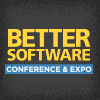Better Software Conference & EXPO 2006

PRESENTATIONS
|
Into the Crystal Ball - Emerging Trends in Plan-Driven Development
Plan-driven development is challenged today by Agile methods, outsourcing trends, and a new emphasis on IT governance and program management. The days of straightforward software development projects are over as project managers must deal with delivery pressure from customers and the marketplace, teams distributed around the globe, and an increase in management and regulatory reporting. Using insight from her years of consulting, Carol Dekkers explores these challenges and recommends ways to adapt your practices. |
|
|
Introduction to the Capability Maturity Model® Integration (CMMI®)
Many organizations have achieved success in using the SEI Capability Maturity Model Integrated (CMMI®) as a framework for their process improvement program. Steven Lett describes the structure and contents of the CMMI®, including the continuous and staged versions of the model. He discusses each of the five maturity levels and their process areas, the specific and generic practices that exist within each process area, and the typical process documentation and work products required for each. |
|
|
Leadership - The Forgotten Element of Agile Development
We often hear about the difficulties and failures surrounding Agile methodologies. Articles describe everything from team and execution issues to the inadequacy of Agile methods on large projects and failures in large organizations. The root cause of these issues is often not a flaw in Agile methodologies but rather a lack of Agile leadership. A commonly held belief is that Agile teams are self-motivated and that leadership is almost evil. Quite the opposite is true. |
|
|
Managing Distributed Teams
Globalization, open source software, and cheap communications have forever changed the structure of software development project teams. Project managers face a new set of challenges with geographically distributed work teams. Unclear expectations, language and idiom differences, lack of direct supervision, and a lack of accountability are just a few of the issues that project managers must overcome. |

Keith Casey, CaseySoftware, LLC |
|
Managing Upward: Getting Approvals for the Tools You Need
Executive management does not like to spend money (on others); however, to build better software you may need to purchase better tools. Although skilled in producing code and running software tests, many development and QA managers do not have much experience preparing proposals and driving requests for funding through the management approval process. To gain their enthusiastic approval, you need insight into the executive heart and mind to better frame your proposal. |
|
|
Mentoring for Rookie (and Experienced) Managers
In the same way that every athlete needs a coach to help him develop and perfect their skills, software managers and technical leads need mentors to help them improve his leadership and management skills. Working with an effective coach should be part of every manager's personal career development plan. With his proven track record of identifying and developing strong technical managers, Kevin Bodie discusses how to find and recruit personal mentors. He also explains how to become a great mentor yourself. |
|
|
Operational Security in Software Development
Research conducted by CERT, the computer security incident response team based at the Software Engineering Institute (SEI), indicates that writing quality coding is not enough to ensure system security. Operating platforms, supported user devices, interface designs, linkages with legacy systems, source code management, data exchange protocols, and controls for authentication data among system modules all impact operational security. |
|
|
Patterns, Influence Strategies, and Stone Age Legacies
Struggling to help your team or organization become more innovative? Have great ideas but can't seem to get them off the ground? We all try to influence others, whether we want to move our department to a better development method or suggest a Friday night movie for the family. We discover new ideas to take back to our workplace but then struggle to make something happen. How can we successfully influence change? From her latest book Fearless Change: |

Linda Rising, Specialist |
|
Process Improvement - Can I Make a Difference?
Although some organizations already have formal processes in place, many do not. Most process improvement begins with one person or one department deciding to do something rather than accepting the status quo. With the right attitude, some simple tools, and a proven method for improvement, you can make a difference for yourself, your department, and ultimately, your organization. Stephanie Penland has helped numerous small and large organizations with process improvement. |
|
| Retrospectives: Five Years Beyond the Book |
|


